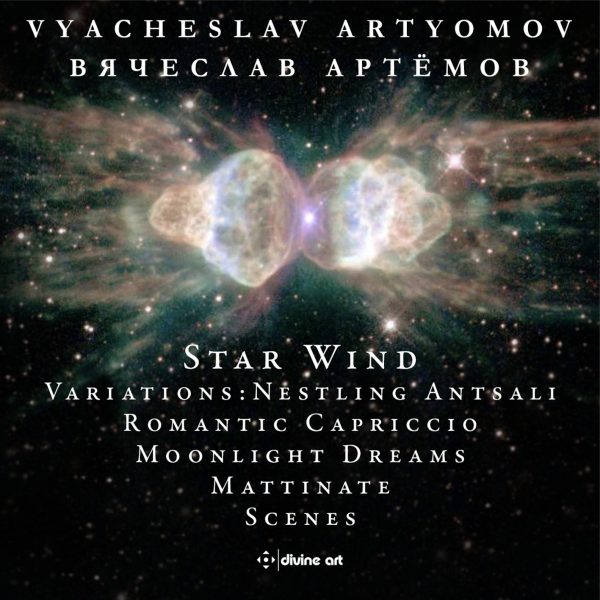MusicWeb International
Artyomov is one of a group of Russian and East European composers – others include Kancheli, Silvestrov and Pärt – who grow up in the days of the Soviet empire, discovered European modernism and went on to forge individual and distinctive idioms. They also each tend to be the object of a cult. I was very taken with a disc of Artyomov I had for review last year so am glad to have been able to hear more of him.
This disc is made of chamber works, all for unusual combinations and sounding to me very much as if Artyomov had just discovered the works of Stravinsky and the second Viennese school and was trying his hand at their idioms. Star Wind is a sextet for violin, cello, flute, horn, piano and glockenspiel and requires a conductor. It is a one-movement work, romantic and expressionist in a manner slightly reminiscent of Berg and without the emotional weight of Artyomov’s orchestral works. I found it beautiful and approachable.
Variations: Nestling Antsali is a set of variations for flute and piano – the latter here played by Artyomov himself. The title comes from a Madagascar folk tale and the technique sounds serial. The opening flute melody is strongly reminiscent of Varèse’s solo flute piece Density 21.5 and the variations are very varied. Though more jagged than Star Wind, this was also an attractive work.
Moonlight Dreams is a song-cycle for soprano with alto flute, cello and piano. The words are four Chinese poems in English translation by David Cheetham, sung in English. This may sound like an influence from Mahler, whose Das Lied von der Erde also sets translated Chinese poems, but a closer parallel would be with Schoenberg’s Pierrot Lunaire, as the accompaniment is for alto flute, cello and piano, similar to, though smaller than, the Pierrot ensemble. Additionally, all four poems contain references to the moon. There are instrumental passages before and after each poem. I had better say at once that Artyomov makes much more beguiling sounds than Schoenberg’s rebarbative masterpiece, though there are some quasi-expressionist solos for the instruments. Nelly Lee sings the songs with a lovely tone and accurate intonation, though her words are not very clear. Fortunately, they are included in the booklet.
Romantic Capriccio rather belies its name. It was, in fact, composed for the twentieth anniversary of the death of Sibelius, and is in turns elegiac and angry. The scoring is for horn – which takes a lead role throughout – piano and string quartet. There are echoes of his violin concerto and also snatches of the stamping chord from Stravinsky’s Rite of Spring. There is a general move from protest to resignation, but I found the work too episodic to be satisfying.
Mattinate (Morning Songs) is a set of two pieces for violin, flute and guitar, which turns out to be a very happy combination, with the two melody instruments throwing arabesques while the guitar twangs away sympathetically below. A soprano has a brief vocalise at the beginning and ending of the second movement. I count this one as a success.
As I do the last work on the disc: Scenes (Grand Pas). This came as a complete surprise. It is a short suite composed for the combination of violin, clarinet, bass, piano and percussion (two players); it needs a conductor. I think Artyomov must have been listening to Stravinsky’s Soldier’s Tale, since his is a similar ensemble and the perky and witty music – not at all what I expect from him – is very much in that style. There is one slower number, which is more like Prokofiev’s Romeo and Juliet, but otherwise Stravinsky is very much the presiding spirit and the work as a whole is a jolly romp. I greatly enjoyed it.
The very striking covers are an attractive feature of this series.
Artyomov is an interesting, indeed impressive composer, though I would resist some of the claims made for him. He is certainly worthy to be considered alongside the three other composers I mentioned at the start. I have yet to hear his Requiem, which is the work which made his reputation. But all the discs are well worth exploring. I would start with Star Wind.
[edited from joint review of several albums]
@divineartrecordingsgroup
A First Inversion Company
Registered Office:
176-178 Pontefract Road, Cudworth, Barnsley S72 8BE
+44 1226 596703
Fort Worth, TX 76110
+1.682.233.4978
We noticed you're visiting from United States (US). We've updated our prices to United States (US) dollar for your shopping convenience. Use Pound sterling instead. Dismiss












